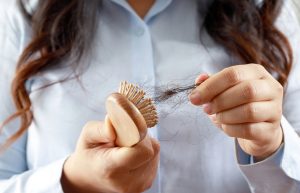Avoiding low-carb, low-calorie diets may improve weight loss efforts. Discover why in the following explanation.

Losing weight is not as simple as it may appear. It requires time, patience, and commitment to get rid of those stubborn love handles. However, during this journey, there can be some unintended consequences, and one of them is experiencing excessive hair loss. If you’re following a weight loss diet, you might have noticed your hair thinning out. Surprisingly, this could be linked to the type of food you’re consuming. Many weight loss diets focus on low-carb and low-calorie foods, which might be causing this issue. Let’s explore this further to understand it better.
Losing Weight and Losing Hair: The Top Cause of Hair Loss During Dieting
Not enough nutrients:
When we go on diets and limit our food intake, our body may not get enough essential nutrients like protein and calories. These nutrients are crucial for keeping our hair follicles healthy. When we lack these nutrients, our metabolism slows down, and it becomes harder for blood and oxygen to reach our hair follicles. As a result, our hair weakens, and we experience hair fall.
Emotional stress:
Dieting can be tough, and it may cause both emotional and physical stress on our bodies. When we restrict ourselves too much, it can lead to hormonal imbalances, affecting our hair follicles. This is especially true when people try extreme diets to lose weight quickly. The stress from these diets can disrupt the normal hair growth cycle, leading to more hair loss.

Simple Tips to Stop Hair Loss Caused by Your Diet
Health experts say that to stop hair from falling out and keep your hair healthy, you need to lose weight gradually and in a balanced way. Avoid extreme and sudden diets, as they can cause a lot of hair to fall out. Now, let’s explore some simple ways to prevent hair fall:
1. Include Protein in Every Meal:
Proteins are the building blocks of hair, so ensure your diet includes enough lean meats, eggs, dairy, legumes, and nuts. They provide essential nutrients like keratin, which strengthens hair follicles, reducing breakage and fall.
2. Load Up on Iron-Rich Foods:
Low iron levels can lead to hair loss, so add iron-rich foods such as spinach, lentils, tofu, and lean red meat to your diet. This vital mineral aids in carrying oxygen to hair follicles, promoting growth and vitality.
3. Don’t Skimp on Vitamin C:
Vitamin C aids in collagen production, essential for healthy hair structure. Citrus fruits, strawberries, and bell peppers are excellent sources of vitamin C. Including them in your diet helps improve hair strength and resilience.
4. Embrace Omega-3 Fatty Acids:
Omega-3 fatty acids nourish the scalp and support hair growth. Incorporate flaxseeds, chia seeds, walnuts, and fatty fish like salmon into your meals to maintain a healthy scalp environment.
5. Say No to Crash Diets:
Avoid crash diets or extremely restrictive eating plans, as they can deprive your body of essential nutrients, leading to hair loss. Focus on balanced and sustainable eating habits for healthy hair and overall well-being.
6. Hydrate, Hydrate, Hydrate:
Staying hydrated is crucial for healthy hair growth. Drink plenty of water throughout the day to keep your hair and scalp moisturized, preventing dryness and breakage.
7. Limit Sugary and Processed Foods:
Excessive sugar and processed foods can cause inflammation and disrupt hormonal balance, leading to hair loss. Opt for whole foods, fruits, and vegetables to ensure a nutrient-rich diet.
8. Consider Biotin Supplements:
Biotin, also known as vitamin B7, supports hair health and growth. If your diet lacks biotin-rich foods like eggs and nuts, consult your doctor about adding biotin supplements to your routine.
Maintaining a well-balanced diet plays a vital role in preventing diet-related hair fall. By including protein, iron, vitamins, and healthy fats in your meals and avoiding crash diets and processed foods, you can promote healthier and stronger hair. Remember to stay hydrated and consult a healthcare professional if you’re concerned about specific nutrient deficiencies. With these simple tips, you’ll be well on your way to luscious, beautiful hair and improved overall health.
